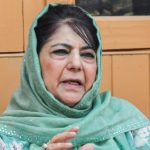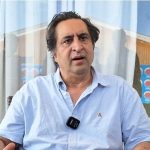“Former Jammu and Kashmir chief minister and National Conference leader, Omar Abdullah, conceded that he could not provide justice to its people but added that his efforts would continue.
“I concede that we could not provide justice to the people of Jammu and Kashmir and Ladakh, but our efforts won’t stop here. Our political and legal fight will continue, on hopes that one day in the future we will get our lost glory that was snatched from us on August 5, 2019,” Abdullah said in a live post on X, from his house in Srinagar.
Amid the Supreme Court verdict on abrogation of Article 370, the National Conference leader has alleged that his house has been locked from outside and he is not allowed to meet anyone, while the Jammu and Kashmir police denied that no orders have been released to restrict any kind of movement.
“I am speaking to all of you like this as my house has been locked and I am not allowed to meet anyone. I wanted to give my reaction to the media on what happened in Supreme Court today, but the media is not allowed to come to my house and I am not allowed to step out from here,” Omar Abdullah said in the live post on X.
“So by compulsion, I had to resort to this (make a video from my home itself). Today, the Supreme Court has finally given its order on Article 370, Article 35A, and two Union territories out of erstwhile Jammu and Kashmir.”
“Were we waiting for this verdict? Definitely not. We moved the Supreme Court expecting justice.”
Omar appreciated the advocates who represented them, saying they have done their part and put forward their arguments in court so as to keep Article 370 intact in Jammu and Kashmir.
“Unfortunately, we could not convince them (the five-judge bench),” Abdullah said. “I will say sorry to those in Jammu and Kashmir, Ladakh, and other countrymen who were supporting us.”
“The matter has not ended, and our efforts also do not end here…I respect the Supreme Court. Why would we go to the Supreme Court if we do not respect it? The truth is that if we were to win this case, would someone still ask me whether I respect the Supreme Court? It would be wrong if I said that I don’t accept the Supreme Court verdict,” Abdullah further said.
On what option he was left with, he said, “So now, do we have more options? Yes, of course. Is it a possibility for us to again approach the Supreme Court? I really don’t know. I have to talk to our lawyers. Once we read the entire Supreme Court ruling, we will discuss and take suggestions from the lawyers.”
“Yes, it was a setback for us, but we are not upset,” he said, reiterating that his fight and efforts will continue.
On the Supreme Court’s direction that statehood for Jammu and Kashmir shall be restored as soon as possible, Omar Abdullah contended it was the status quo of Article 370 that was more important for him, rather than statehood.
Earlier today, before the Supreme Court judgement on Article 370, the J-K People’s Democratic Party, on its official X handle, also alleged that the party chief, Mehbooba Mufti, has been kept under house arrest.
“Even before the Supreme Court judgement is pronounced, police have sealed the doors of the residence of PDP President Mehbooba Mufti and put her under illegal house arrest,” the PDP said in a post on X.
Meanwhile, the Supreme Court on Monday upheld the Union Government’s decision to abrogate Article 370 of the constitution, which gave special status to Jammu and Kashmir and said that every decision taken by the Centre on behalf of a state can’t be subject to a legal challenge.
A five-judge Constitution bench comprising Chief Justice of India DY Chandrachud, Justices Sanjay Kishan Kaul, Sanjiv Khanna, BR Gavai, and Surya Kant delivered the verdict.
CJI Chandrachud, reading out the judgement, said that every decision taken by the Centre on behalf of a state under proclamation can’t be subject to a legal challenge and it will lead to the administration of the state coming to a standstill.
The Supreme Court said that it has held that Article 370 is a temporary provision. “The proclamation of Maharaja stated that the Constitution of India will supersede. With this, the para of Instrument of Accession ceases to exist. Article 370 was an interim arrangement due to war conditions in the state. Textual reading also indicates that Article 370 is a temporary provision,” the Court said.
On August 5, 2019, the central government announced the revocation of the special status of Jammu and Kashmir granted under Article 370 and split the region into two union territories.
The Supreme Court also directed the Election Commission to hold Jammu and Kashmir Assembly elections by September 30, 2024. The Supreme Court said, in view of the Centre’s submission on restoration of statehood of Jammu and Kashmir, it directs that statehood shall be restored as soon as possible. (ANI)








